- Living & Working abroad
Cultural Differences When Moving Abroad
Relocating abroad is an exciting journey that opens up new opportunities, but it also comes with its own set of...
Read moreLiving & Working abroad
Welcome to the Netherlands, the country where tradition fuses with innovation: masterpieces of art, windmills, tulip fields and candlelit cafes coexist with contemporary architecture, avant-garde design and effervescent nightlife. Although small, the country has become one of the top destinations for expats who really want to work for top companies and boost their career in one of the bustling hubs of industry, culture and international business!
Relocating here also means enjoying an exceptional work-life balance and being part of one of the world's safest and most tolerant communities. Indeed you will have no trouble finding your place in the country of gezelligheid and fietsen!
Table of content
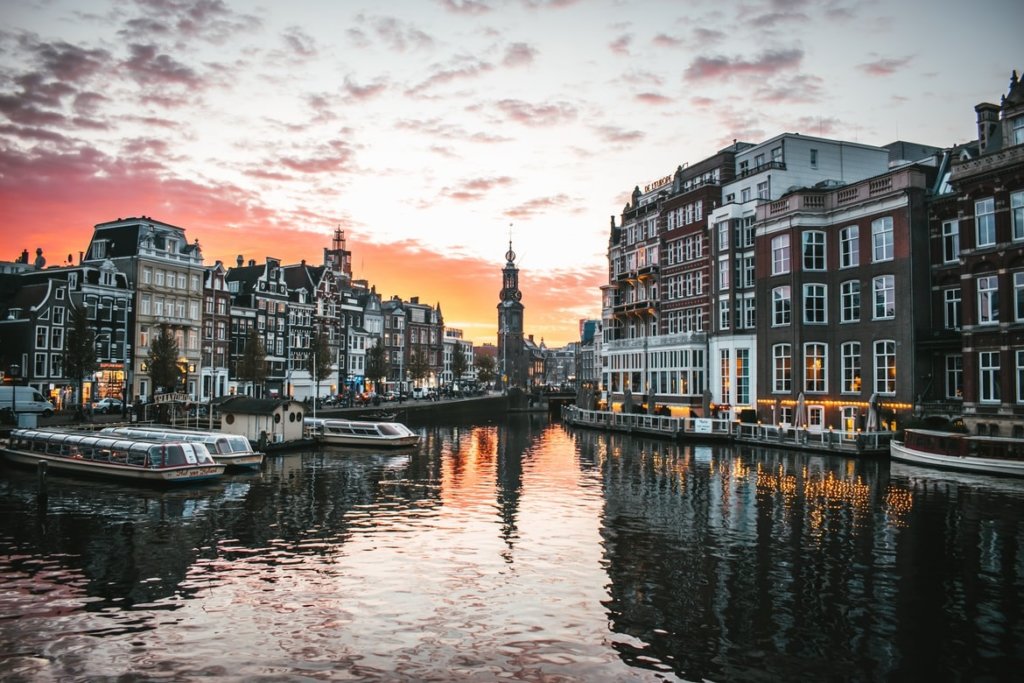
Basic information about the Netherlands:
Did you know?
Because there are so many expats living in the Netherlands, you don’t need to worry too much about your location as you’ll always be able to find fellow internationals. Here are some of the main cities that expats choose to move to:
Amsterdam
Being the capital of the Netherlands, Amsterdam is the obvious choice for any expat looking to relocate to the country. It’s also home to many big international companies, attracting many young professionals.
This lively, vibrant and upbeat city is very forward-thinking and welcoming, providing a safe and inclusive environment for everyone. Quality of life is high, education and transport are good, and there’s plenty of bars, cafes and clubs to keep you interested when you’re not working--there’s nothing not to love about this beautiful city.
Maastricht
If you want a city full of culture and festivals, Maastricht could be the perfect home for you. It’s one of the safest cities in the Netherlands, second only to Amsterdam and has a much more relaxing and suburban feel than the capital.
Many families and older people tend to live in this city, so if you’re looking for a quieter pace of life, this is where we’d recommend relocating to.
The Hague
If you’re looking for work, The Hague is home to over 131 international organisations that are often recruiting international and multilingual workers - especially if you work in the fields of governance, social policy and law.
Despite being the largest of cities in the Netherlands, The Hague still has a relaxed and comfortable vibe, combining a historical and multicultural feel that has made it such a popular destination for people from all over the world to relocate to.
Rotterdam
Rotterdam is one of the major cities in the Netherlands that isn’t so popular with tourists, which is excellent news for many expats who want to start their lives in a new country. Since being destroyed during the 2nd World War, the city has been rebuilt and completely modernised, which gives it a very different vibe from many of the other traditional cities in the country.
With quirky architecture, lower costs of living, and a diverse and liberal population, we’re not sure why tourists aren’t flocking to this city - but it’s better for us expats!
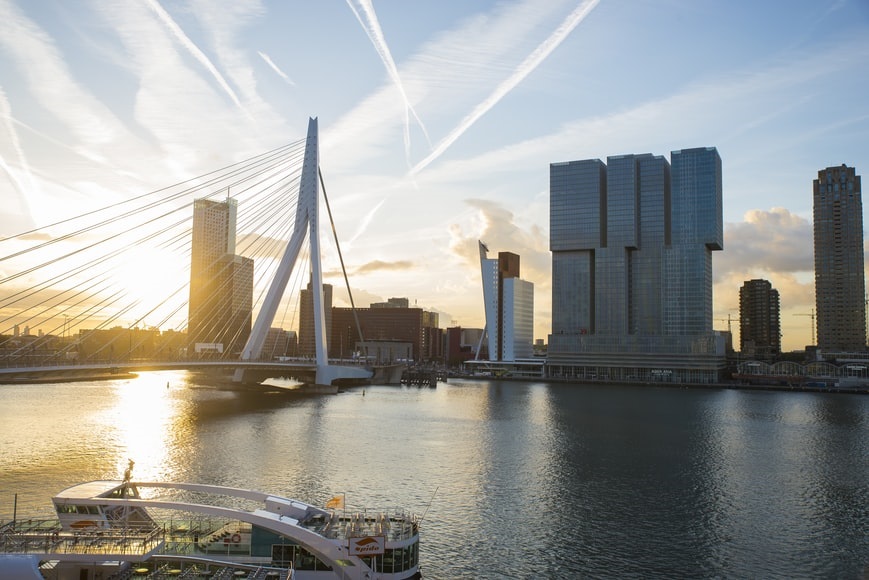
Housing in the Netherlands
As in other popular European countries, there is a shortage of affordable housing in the Netherlands, especially in big cities. For example, in Amsterdam, the apartments are costly and difficult to find, so the easiest way for expats to find somewhere to live is usually by using a realtor.
The cheapest apartments are available through various housing associations, where you can apply for particular apartments based on your income. So people with higher incomes can only apply for the slightly more expensive apartments and low-income earners for the cheaper ones. But since the relatively cheap apartments are very popular, you should expect a lot of competition and long waiting times.
If you're looking to move to Amsterdam, you can expect to pay around €1000 rent a month. It can be slightly cheaper in other cities: The Hague will be €700, Rotterdam €600 and Maastricht €617. This fee will normally not include additional costs like water, electricity and heating, will be added. You will also usually be asked to pay a deposit equivalent to 2-months of rent when you start your lease.
The two types of rental agreements in the Netherlands are fixed-period rental contracts and indefinite rental contracts. Fixed-period tenancy agreements set a minimum fixed period for rent, usually six to 12 months. Some leases include clauses that allow early termination in specific contexts provided sufficient notice, generally at least one month. On the other hand, indefinite rental contracts have no set termination date, allowing a more flexible, open-ended lease.
Utilities aren't always covered by the owners and are usually an additional expense. However, keep in mind that landlords are responsible for general maintenance and insurance!
The Dutch are big on work-life balance, so love finding fun things to spend their time when they want to relax and switch off from a busy day/week of work. If you’re moving to the country, you’ll quickly realise that there are a whole load of things you can spend your free time doing.
You’d think that being one of the most densely populated countries in the world that there wouldn’t be much nature to enjoy in the Netherlands--but you’d be wrong! There are plenty of parks and forests that you can explore, plus you’re never too far from the sea to enjoy a day at the beach.
If culture is more your thing, you can enjoy some of the popular museums around the country where you can visit the works of Rembrandt, Van Gogh or Vermeer. There’s also a lot of beautiful architecture to enjoy--both old and new buildings.
For adrenaline junkies, you can take advantage of some of the best amusement parks in Europe. One of the most famous is the Efteling, which is based on the Grimms’ fairy tales.
There’s also something for everyone at the country’s regular events and festivals that take place throughout the year. Here are some of the most popular:

The cost of living in the Netherlands is not the cheapest, especially if you choose to relocate to one of the major cities, but it's still possible to live in the country without completely breaking the bank. Despite the higher costs of living, in return, you will get access to an excellent quality of life, high standards of housing, access to green spaces and excellent public transport, which together do make the higher costs worth it.
Compared to Stockholm, a notoriously expensive European city, the Netherlands is slightly cheaper. Amsterdam's consumer prices are 3% lower than Sweden, but the rental prices are 16% higher in Amsterdam.
On average, a single person can expect to pay around €852 a month to live in the Netherlands, which doesn't include the cost of the rent.
| Amsterdam - Netherlands | |
| Groceries | |
| 1 kg oranges | €1.76 |
| 12 eggs 1 kg potatoes | €2.48 €1.31 |
| Restaurant/cafe | |
| Beer (0,5 l) | €5 |
| Meal for 2 at restaurant | €70 |
| Cappuccino | €3.35 |
| Sport & Leisure | |
| Gym membership | €41 |
| Cinema ticket | €12 |
| Public transport | |
| Single ticket bus | €3.2 |
| Taxi (normal tariff - 1km) | €2.4 |
| Average salary | €3,200 |
The Netherlands is a very organised country, so it only makes sense that they’d have an equally organised public transport system to help you get around. Whether you want to travel by train, bus, tram or ferry, you can always get where you need to be quickly and in comfort.
The country has an extensive rail network - operated by NS - that connects all major cities. The Netherlands is a pretty small country, so travelling from Amsterdam to Groningen will only take 2 hours. There are two types of NS trains to look out for: the Sprinter and the Intercity. Rather confusingly, the Sprinter is the slower of the two, stopping at all local stations. Intercity services, on the other hand, only stop at major stations.
When you need to travel around a city, you can use the network of buses, trams, metros and even ferries! However, wherever you are in the Netherlands, you’ll be able to use your OV-chipkaart, the national smart-card payment system for public transport. There are two types of OV-chipkaart: anonymous and personal. Anonymous cards can be bought and topped-up from machines and ticket offices. Personal cards need to be bought online, and you will need to provide a photo for the card. These cards can be topped-up online or at a ticket machine. Alternatively, you can sign-up for automatic top-ups when your balance falls below a certain amount.
*Tip: Be aware that the distance of your journey determines journey costs. Therefore, always remember to check out when leaving the bus to avoid any unexpected charges on your card! Services usually start running at 6.00 am and will continue until midnight. Depending on your location, there can be night service, but it is not as smooth as the standard service.
However, with picturesque, flat landscapes that draw the visitor to every dike, canal, river and coastal strip, cycling is one of the great pleasures in the Netherlands. You can see rental stalls everywhere, and there are about 32,000 km of bike lanes, so… pedal!
If you prefer to drive your car, driving licenses obtained in Europe are valid in the Netherlands. However, there are some restrictions, like requiring the driving license to be valid for 15 years from the issue date. For example, if you received the driving license in 2006 in Sweden, you can use it until 2021 in the Netherlands. After that, you have to exchange it for a Dutch driving license.
To get a Dutch driving licence, you just need to submit an ID document, a photo, and your current driving license to the local authorities.


There is a huge community of expats for a country with over 17 million people, with around 100,000 expats in Amsterdam alone. If you’re moving by yourself, or don’t know anyone else that lives in the Netherlands, you may be interested in joining some expat groups to find fellow internationals. To find these groups by simply googling the name of the city you’re moving to, and “expat groups” or “international groups”.
It’s also important to immerse yourself in Dutch culture and get to know some locals rather than just spending all of your time with people from your home country. Dutch people are very warm and welcoming and will help you get an insider’s view of living in the Netherlands. The Dutch are one of the happiest people in the world. In fact, The Netherlands is ranked fifth in the World Happiness Report. However, complaints (not in a serious way) about the weather or football are part of their daily conversations!
In the Netherlands, Dutch is the primary language but the majority of people will also be able to speak English - especially in the major cities. However, just because most people will be able to speak English, doesn’t mean that you shouldn’t make the effort to try and learn a few phrases in Dutch to help you get by!
Here are some common phrases you should learn:
If you’re an expat looking to move to the Netherlands, there are various sectors that are always in need of new workers. A positive thing is that more and more international companies are opening offices in the Netherlands, which translates into many opportunities for international and multilingual candidates!
Some of the main industries in the Netherlands that could be of interest to expats include:
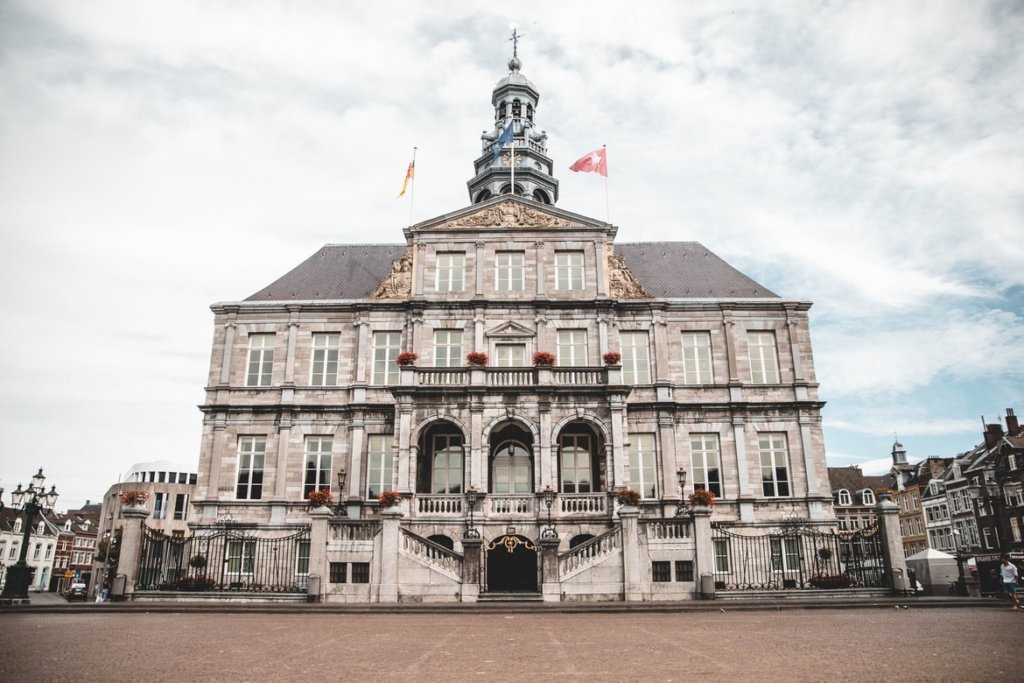
In the Netherlands, you’ll work a maximum of 9 hours per day and 45 hours per week, but it will typically be between 36–40 hours per week. For a full-time job, you are entitled to at least 20 paid holidays, but you may also get more, depending on the company that you work for.
In the Netherlands, it is common to get a current fixed-term contract at the beginning of a new job with a probationary period of one month for 2-year contracts or 2 months for other contracts. You’ll also be expected to work a notice period when you decide to leave the job.
If you’ve worked at a company for less than 5 years, you only need to work a notice period of 1 month. It then goes up until you reach 15 years of employment with one company, in this case, you will have to work a notice period of 4 months before being able to leave.
The Dutch have a very formal business culture, which may feel quite different compared to what you’re used to in your home country. They can be rather direct and sometimes come off as blunt, but it’s never intended rudely - it’s just their culture.
They don’t react well to boastful people or try to flatter them. They are much more impressed by a well-structured, factually accurate presentation with clear evidence and data to back up your points.
Known as being very analytical people, the Dutch will often take time to analyse proposals in great detail (so don’t view it as them being picky!) and will always take you at your word, so don’t over promise or make claims that you don’t know if you’ll be able to keep.
What’s nice about Dutch working culture is that there’s an emphasis on teamwork. Managers will often ask for input from their team and are open to constructive criticism when needed.
One thing that may be different in Dutch working culture compared to what you’re used to is that going out for lunch is quite unusual unless you’re working for an international company. Lunch is often seen as a quick snack, and most people will bring in their packed lunches to the office.
The minimum wage in the Netherlands is €1,701 per month for people over the age of 21, which can be considered quite high in comparison to other European countries, although this does come along with a slightly higher cost of living.
The minimum wage refers to full-time positions of 36, 38 or 40 hours, but there is no fixed minimum wage per hour. This means that those who work 40 hours receive the same minimum wage as workers with 36 hours per week.
Income tax is calculated on the size of your income and will be deducted from your salary, as well as other additional social security contributions. On average, between 37-50% of your net salary will be deducted for taxes:
| Annual taxable income (gross) | Total rate |
| € 0 - 68.508 | 37,10% |
| € 68.508+ | 49,50% |
As the Netherlands is part of the EU, it’s pretty simple to move to the country if you’re also from one of the EU member states.
Under the agreement between EU states, people with a European passport are allowed to stay in the country for 90 days. If you plan to be there longer, you’ll just need to apply for a long-term residence permit which is valid for 5 years.
One of the most important reasons to register is that you will then receive your BSN number (personal public service number), which you need for all your administration in the Netherlands. This includes opening a bank account, receiving your salary, visiting a doctor, getting health insurance and applying for benefits.
To register in the municipality and be assigned a BSN number, contact the municipality within 5 days of arrival to schedule an appointment, where you will need to bring the following documentation:
Your BSN will be sent by post within 3 weeks.
Everyone living in the Netherlands is required to register their address in the Personal Records Database (BRP). It is very important to be registered at the correct address of residence. Depending on individual circumstances, it may be necessary to present relevant birth, marriage or death certificates and other required documentation to the municipality upon registering for the first time.
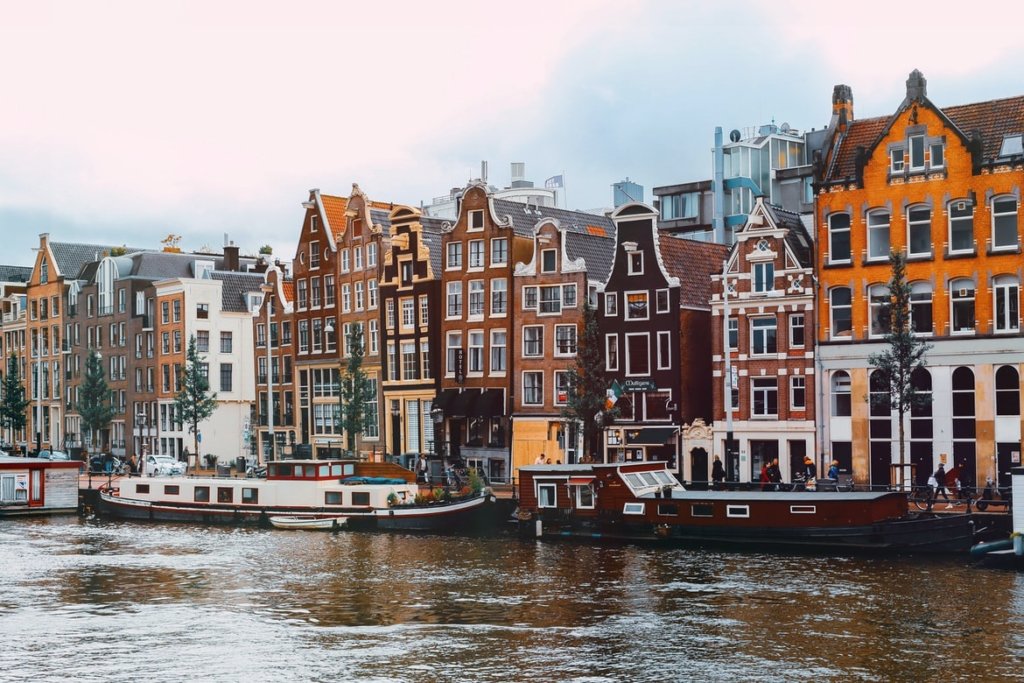
Dutch healthcare is among the best in the world, with people having access to advanced treatments and preventative care during all stages of their lives. The health insurance system in the Netherlands is based on the principle of social solidarity. Together, we all pay the overall cost of healthcare. Everyone contributes, for example, to the cost of maternity care and geriatric care.
Hospitals use the latest equipment and medical staff are continually educated on the basis of the latest insights from the scientific community. General practitioners (huisarts) play an important role in the Dutch healthcare system; they are the first port of call if you have health problems. People are free to choose their GP, giving you the convenience of choosing one close to home. Doctors have practices in residential areas and operate on an appointment system. If necessary, the doctor will refer patients to a specialist at a hospital.
In the Netherlands, there is a health insurance obligation. This means that you must take out health insurance within the first four months of moving to the country. You can choose your basic insurance yourself (zorgverzekeraar), and then you can choose whether you want to add on any additional services. Contributions to health insurance are not deducted directly from your salary, but must be paid separately. The costs amount to approximately € 1,000 per year, plus income-related supplements.
Some of the most popular health insurance providers in the Netherlands include:
Keep in mind that you are free to change your insurance provider once a year and that you can opt to take out additional insurance to cover, for example, physiotherapy or dental care.
You can use your current account and card for going to the shops, in the supermarket and travelling, but most of the time you will have to set up payments for your accommodation using a Dutch bank account - this is something that is required by most landlords when it comes to your rent and utilities payments, and a better option when you need to get your salary!
Luckily for expats, opening up a bank account in the Netherlands is very quick and simple--it will only take a maximum of a couple of weeks for you to start being able to use your new account and bank card. All you need to do to open up an account is visit the local bank branch of your choice and bring a few documents with you:
Choosing the right bank for your needs depends on several factors, and there is no one-size-fits-all solution. But banks in The Netherlands are competitive, and offer many special products to serve different types of customers.
Some of the most popular banks in the Netherlands are:
A pretty great plus to the Dutch system is their ATM fees. If you withdraw money from one of the above bank’s ATMs that you have an account with, there are no ATM fees. If you use a different bank’s ATM, you’ll probably have to pay a fee of anywhere from €1.50 - €3 per transaction. In addition, most major banks in The Netherlands offer an international wire transfer service, with varying fees and exchange rates that you would have to check in the case you want to make an international transfer.
If this article has convinced you that the Netherlands could be the next country you’ll be calling home, we think you’ve made an excellent choice - and it’s one you’re not going to regret!
Not only is the Netherlands a friendly and welcoming nation that you’ll feel instantly at home in, it’s also a great place to kickstart your career and find a job in one of the many international companies that have made the country home. With a chilled out and relaxed lifestyle, you can enjoy a better work-life balance and keep yourself occupied with the huge range of fun events and attractions that are never more than a short train journey away.
With a large population of expats, especially in the major cities, and the majority of the population being able to speak a good level of English, you’ll never have to worry about feeling out of place or struggling to find other people in the same position as you.
So, what are you waiting for? Why not start packing your bags for the Netherlands right away!
Here are our top 10 reasons why you should consider the move to the Netherlands:
So if the thought of living and working in the Netherlands attracts you, why not check out some of the job vacancies that we offer in the country here at Workwide Recruit!
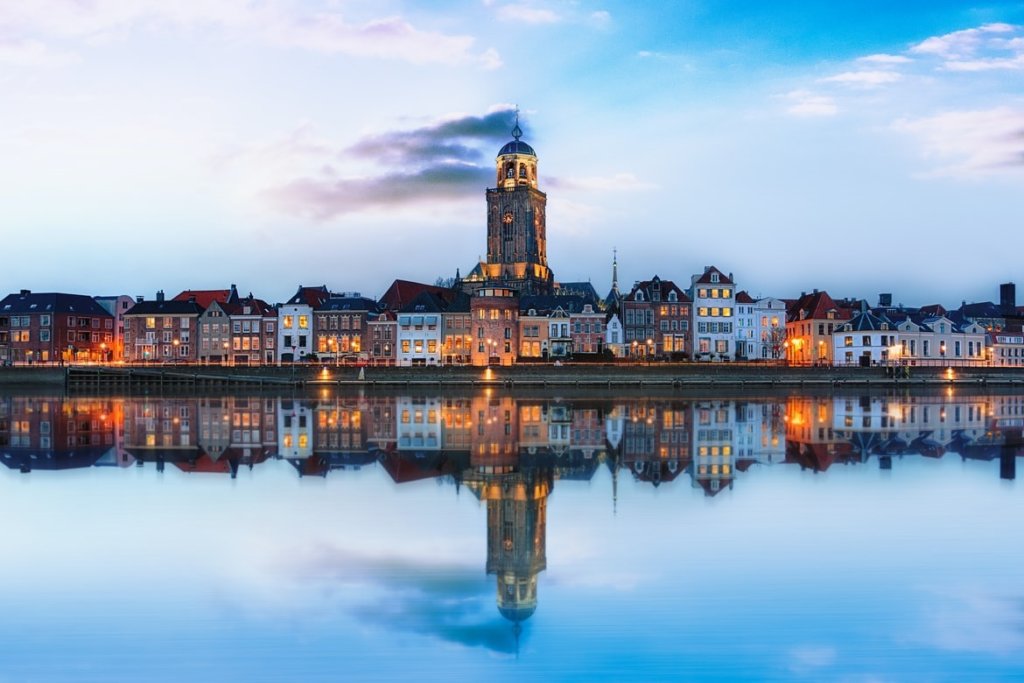
Relocating abroad is an exciting journey that opens up new opportunities, but it also comes with its own set of...
Read moreThere’s great comfort in connecting with other expats who can share their experiences from the destination you’re considering because every...
Read more
